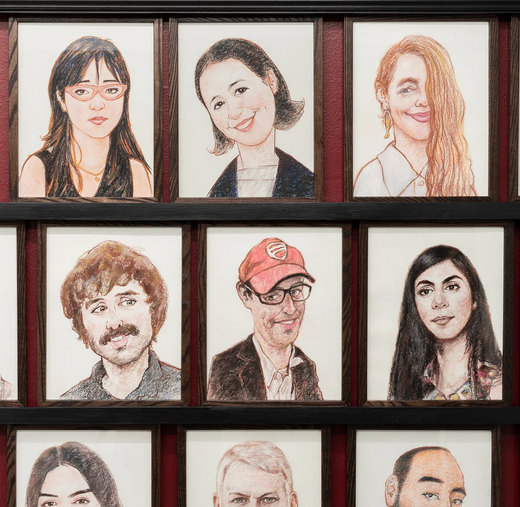Experts, the Suburbs
Amalia Ulman at Jenny’s
January 28 – March 4, 2023

There is a childishness in the 70 faces, and the eyes are done to make them wistful. In an actor’s face this would fix a sense of hope, of a pristine hollowness that is ready to be filled with the perfect role. Here, it looks to the past, before the rates started to rise. Everyone looks scared. The show is good because it says good-bye.
We talk about losing. About losing it all and selling at the bottom. But still, it’s romantic. This is the end of a long and brutal marriage. And what’s better than being married, Kansas City, steak, chicken, lobster, and peas? What you see here is who survived. I think someone called it “social sadism” once; I wonder what they would have thought of the movie Dear Jane. So, after years of bitterness and fighting, flirting with film, somehow you are still in love. In love with art and with the city that is art. It’s pumped out of the NYSE and runs through the streets. It goes downtown.
Except not anymore. You don’t even have to look further to see the change, and of course you can see it here, too. When things in the industry look the same it means there is a problem. Competition is ruthless, and if you are recognizable then it has your coordinates. Assassination time. But it needs to still exist; the demand must be filled; and that’s what I see. I wonder if the people looking back at me also see it.
Here, everyone plays themselves in a production of rapidly diminishing returns. They are paid in their own faith and the reflection of this truth is unbearably harsh. Ulman made a tragedy, a 30-something tragedy. Rent tripled and the Zoomers sold their paper. Maybe like some paintings of dealers from 2007, some things change, some stay the same. And just like that, the crash is coming.
Everyone got threshed; all the portraits lean to the left and right, yielding to the wind and blade. Everyone looks attractive, everyone looks in control, everything is okay. What does a person like Keith McNally mean in all this? A haute bourgeois arrière-garde disappearing into the horizon, masculine, erudite, sleazy, overweight, effortlessly ruthless. Paying the price with scandals and court cases. This might seem like mumblecore, but no Hartley character was ever so strategic, so willing to subsume impulse to movement.
The walls of the house, bricks of faces, have a strange density. I would have expected impenetrability, the seamlessness of a perfected politburo, whose absences would have meant early morning expulsions. There are gaps, however, between the frames and behind the eyes. If I live in a prison then at least I want the opportunity for upward mobility, for hiring from within and for new kitchen renovations. She’s always been an artist of vanity and whatever-you-want-to-call-it surfaces, but it’s not a denunciation, it’s not hagiography, it’s just what’s left. What’s left to love, who still believes, a relentless metabolism of the conversion and exchange of passions.